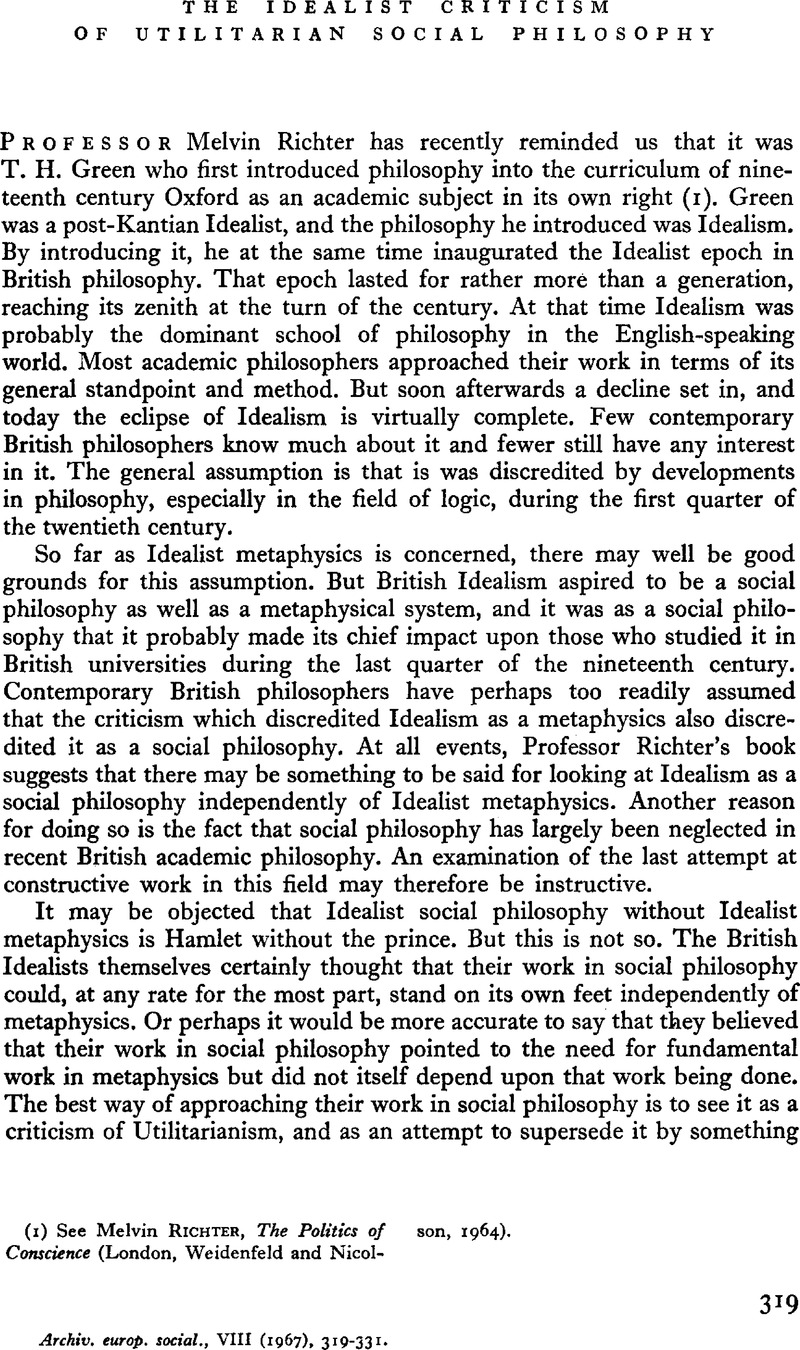Published online by Cambridge University Press: 28 July 2009

(1) See Richter, Melvin, The Politics of Conscience (London, Weidenfeld and Nicolson, 1964).Google Scholar
(2) The Utilitarianism which they criticized was what may be called “Classical Utilitarianism”: that is, Utilitarianism as it was expounded in the writings of Bentham and of James and John Stuart Mill.
(3) Cf. Green, T. H.'s essay on the history of philosophy in his Collected Works, Volume 1, Philosophical Works (London, Longmans, 1906).Google Scholar
(4) Expositions of the doctrine of selfrealization are to be found in Bradley, F. H.'s Ethical Studies (Oxford, Oxford U.P., 1935)Google Scholar. in Green, T. H.'s Prolegomena to Ethics (Oxford, Oxford U.P., 1906)Google Scholar and in Bosanquet, B.'s Philosophical Theory of the State (London, Macmillan, 1951)Google Scholar. In what follows, I have in mind especially Bosanquet's account, but it is fundamentally the same doctrine in all the various expositions.
(5) Cf. Green, 's Prolegomena to Ethics, op. cit.Google Scholar
(6) Cf. Lewis, H. D., Freedom in History (London, Allen and Unwin, 1962)Google Scholar, where a similar criticism is made of Green's ethics.
(7) Bosanquet, , op. cit.Google Scholar
(8) Bosanquet, , op. cit.Google Scholar
(9) Cf. SirBerlin, Isaiah, Two Concepts of Liberty (Oxford, Oxford U.P., 1958)Google Scholar, and Cranston, M., Freedom: A New Analysis (London, Longmans, 1954)Google Scholar. Some attention has been given in recent years by British philosophers to the subject of freedom. This may seem to be evidence against my contention that social philosophy has largely been neglected by British philosophers. But one or two swallows do not make a summer, and I think the general judgement still stands. Important though it is, freedom is only one of many topics in social philosophy.
(10) Cf. Bosanquet, , op. cit.Google Scholar, from which the following is a summary.
(11) Bosanquet, , op. cit.Google Scholar
(12) Cf. Green, , Lectures on Principles of Political Obligation (London, Longmans, 1950)Google Scholar, and Bosanquet, , op. cit.Google Scholar
(13) Cf. Green, , op. cit.Google Scholar
(14) Cf. Green, , op. cit.Google Scholar, where, speaking of Czarist Russia, he says: “It is only by courtesy that we can call Russia a state.”
(15) Cf. Richter, , op. cit.Google Scholar
(16) In addition to Green and Bosanquet, cf. Ritchie, D. G., Natural Rights (London, Allen and Unwin, 1952).Google Scholar
(17) An exception must be made in the case of L. T. Hobhouse. But it is doubtful whether he made any significant advance on Idealist social philosophy. What is of value in his work is to be found in theirs. Moreover, he was responsible for a misleading account of Idealist political theory which has unfortunately been only too influential. Its vices are not those which he depicts in his Metaphysical Theory of the State (London, Allen and Unwin, 1962)Google Scholar. In this connection, cf. Blanshard, Brand, Reason and Goodness (London, Allen and Unwin, 1961)Google Scholar, and my Social Philosophy of English Idealism (London, Allen and Unwin, 1962).Google Scholar
(18) Cf. the work in ethics of G. E. Moore, and of the Deontological school of Prichard, Ross and Carritt, and, more recently, the so-called meta-ethical writings of R. M. Hare and P. H. Nowell-Smith.
(19) Cf. especially Green, , Prolegomena to EthicsGoogle Scholar, and Bosanqubt, , op. cit.Google Scholar
(20) In The Social Philosophy of English Idealism I attempted to disentangle Idealist social philosophy from Idealist metaphysics. But I did not then sufficiently appreciate the flaw in the doctrine of self-realization, and what has been said here on that point is intended to correct my earlier account.